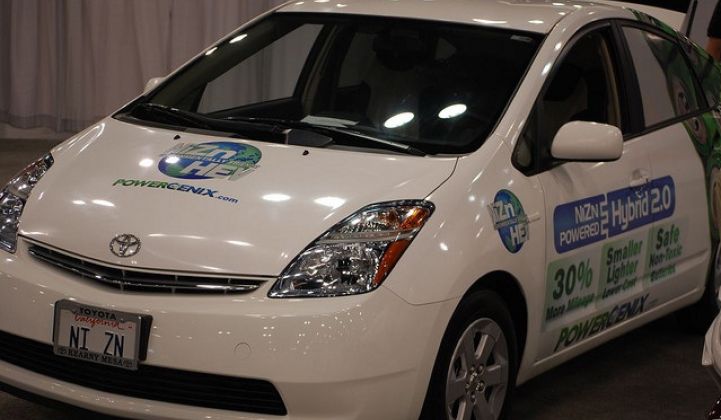It was just a year ago that battery startup PowerGenix ditched its attempt to crack the consumer battery market to refocus on a little-known, but potentially massive automotive market: microhybrids.
Looks like the shift worked out well. By year’s end, PowerGenix plans to sign a joint venture with a “large Chinese state enterprise” partner. By the end of 2012, the JV should be rolling out about 400,000 batteries per year, CEO Dan Squiller told me in a Monday interview. The company, which has raised $61 million to date, is also on the verge of announcing a new round of funding in the next month, he told me. (While he wouldn't say how much, Squiller told us last year that the company was seeking about $20 million.)
Squiller wouldn’t provide many more details on the Chinese partner, except to say it was a “multibillion-dollar” supplier to domestic and international automakers -- though not as a battery maker -- and would pursue markets both in China and around the world.
It’s a huge step for the San Diego-based startup’s plans to bring rechargeable nickel-zinc batteries to market -- but not in direct competition with the lithium-ion batteries now dominating the plug-in hybrid and electric vehicle industries. Instead, PowerGenix is targeting microhybrids, or so-called “start-stop” vehicles, that use batteries to prevent cars from idling their engines at stoplights or in traffic.
That requires a much smaller battery than needed to actually push the car down the road, but it can still shave up to 5 percent to 7 percent from average emissions and fuel costs, according to most estimates of current technologies using lead-acid batteries. PowerGenix says that its rechargeable nickel-zinc technology can beat lead-acid batteries and offer 10-percent to 12-percent reductions in fuel use and emissions.
That’s mainly because PowerGenix’s batteries have longer cycle lives than their lead-acid counterparts, meaning they can be discharged and recharged many more times without degrading capacity, Squiller told me. While a typical PowerGenix 500-watt-hour battery costs about $175, compared to $120 for an equivalent lead-acid battery, the much longer lifespan of rechargeable nickel-zinc should yield a total cost of ownership that’s 40 percent lower than lead-acid, he claimed.
Microhybrids are big in Europe, where many automakers are relying on the technology to meet stringent emissions reduction and fuel economy mandates. But the technology is starting to move to North America as well, and Squiller said that China will also be a huge growth market -- all in the service of finding cheap ways to cut emissions and save gas.
Technology to turn off engines off when the car isn’t moving costs about $60 for each percentage point of fuel use reduction, Squiller said. By comparison, hybrids like the Prius cost about $120 for each percentage point in reduction, and plug-in hybrids and EVs are even more expensive, he said. Sure, there’s a limit to how much fuel economy can be achieved just by stopping useless engine idling, but going cheap could also make it a much more attractive market in the shorter term. Lux Research predicts that the global market for microhybrid batteries will grow from $280 million last year to $2.7 billion in 2015.
By 2020, “the number of vehicles with this technology will total about 65 million vehicles, and the battery market size is going to be roughly $15 billion,” Squiller said. “This dwarfs anything else in the electrification of vehicles -- but you don’t hear anybody talking about this.”
That’s not exactly true, of course -- PowerGenix will have plenty of competitors in the microhybrid battery field. One of the biggest will be Johnson Controls (JCI). The industrial conglomerate has been supplying advanced lead-acid microhybrid batteries to Ford, which plans to offer the technology in about 20 percent of its vehicles by 2014, and pretty much dominates the general automotive battery market along with such coequals as Exide and GS Yuasa.
Others are aiming their sights at the market. Lead-carbon battery maker Axion Power is supplying test batteries to BMW for microhybrids, and lithium-ion battery maker A123 has targeted the market with a 12-volt system. Whether or not lithium-ion is best suited to the smaller-scale, high-power-density needs of starting up car engines over and over is another question.
PowerGenix will need a big partner to compete for this market, Squiller said. “No large auto company is going to buy batteries from an early-stage company,” Squiller told me. “The only way you can do business with the big guys is if you’re a big guy yourself.”
Indeed, one of the reasons PowerGenix abandoned its rechargeable AA battery business was because the marketing costs to get consumers to adopt a new product were much too high, he said. Tackling the automotive market doesn’t require the same kind of brand recognition, but it certainly requires a ton of testing, as well as proof that the technology can be manufactured at scale.
Since the company switched to large-format car batteries last November, it has rolled out test batteries at its plant in Shenzhen, China, which can produce about 1,000 units per month, and delivered them to automotive partners for testing. In May, it landed initial safety standard certification from the Department of Energy and Society of Automotive Engineers, though Squiller said many more months of testing with partners remains to be done.
As for protecting PowerGenix’s 80 or so patents on its rechargeable nickel-zinc technology, Squiller told me that much of its “IP-dense” technology will be made and supplied by PowerGenix to its Chinese partner, which will be the majority owner of the JV.
PowerGenix is also looking beyond car batteries, and plans to sign a licensing agreement with a “large, U.S.-based, publicly held battery company” to use rechargeable nickel-zinc batteries for uninterruptible power supply and backup power applications, Squiller said. He wouldn’t name the potential licensing partner, however.



